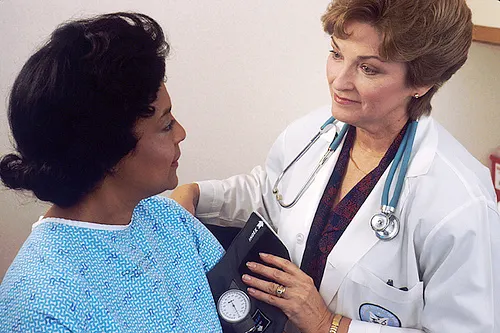What is Therapeutic Adherence?

The issue of therapeutic adherence is important, and the success of treatment depends largely on it. The matter is quite a complex one because there are many factors that affect it.
In fact, the first challenge is that there is no consensus on the definition of therapeutic adherence. Some health professionals consider it simply as compliance with prescriptions. Others, however, see it as a phenomenon that has multiple factors.
Also, there are many causes and consequences regarding a lack of therapeutic adherence. This means that each case is different. For this reason, it’s not easy to understand or address. Let’s take it step by step.
What is therapeutic adherence?

Therapeutic adherence is the active and voluntary commitment of the patient with the treatment prescribed by a health professional. Its objective is to achieve a specific result. This commitment must be agreed upon between the patient and the medical staff.
Therapeutic adherence refers to a set of behaviors. From the patient’s point of view, it includes the acceptance of the treatment plan and effectively following the guidelines provided. It also includes avoiding risky behavior and incorporating lifestyles in accordance with the therapeutic proposal.
From the doctor’s point of view, first of all it depends on the ability to establish a positive relationship with the patient. They must offer clear instructions and make sure they have been understood. Likewise, they must motivate the patient so that their adherence to the treatment is voluntary.
Take a look at this article: The 5 Worst Lies You Can Tell Your Doctor
Factors that influence therapeutic adherence
There are many factors that could either promote or, on the contrary, hinder therapeutic adherence. Among the main ones, there are:
- Doctor / patient interaction: Refers to the quality of the relationship. When it’s positive, adherence is usually greater. The essential factor is communication. The more clear and motivated the instructions, the better.
- The therapeutic regimen: The element that influences adherence most is the complexity of the prescription and the side effects of the treatment. Single-step regimens are the easiest to adhere to. On the contrary, those with greater side effects are more difficult.
- Characteristics of the disease: When the treatment quickly alleviates the troubling symptoms, there is greater therapeutic adherence. Asymptomatic patients generally have poorer adherence.
- Psychosocial factors: Beliefs, attitudes, lifestyle, and values are factors that facilitate or hinder adherence. In particular, is the perception of the effectiveness of the treatment and of the doctor.
- The environment: If the patient receives support from those around them, it’s easier for them to follow medical instruction. Aspects such as religion and the attitude of the family towards health can have a significant influence.
Consequences of not adhering

The clinical consequences depend on the type of non-compliance. At times, the treatment never starts, while on other occasions it’s interrupted after it has been started. The effects of this will depend, among other factors, on the illness and the condition of the patient.
In general, lack of adherence also causes an increase in healthcare costs. It leads to an increase in the number of hospitalizations and visits to outpatient clinics or emergency centers. It can also lead to changes in prescriptions and a greater need for diagnostic tests.
Check out this article: Researchers Have Discovered a New Cancer Treatment that Might be Better than Chemotherapy
How to achieve greater therapeutic adherence
Currently, there’s a lot of ongoing research, related to the design of strategies to achieve greater therapeutic adherence in patients. Although there’s no consensus, in general, the following measures are recommended :
- Simplify the prescription regime as much as possible: The fewer doses and medications that are prescribed, the easier it will be to achieve patient adherence.
- Behavioral influence: Includes actions to model the behavior of patients in relation to treatment. It includes reminders, follow-ups, rewards, etc.
- Educational aspects: The patient shouldn’t only know what to take and when to take it but also why it’s important to do so. This makes it easier for them to voluntarily follow the prescribed regime without any pressure.
- Family and social support: Includes actions aimed at providing social support, such as home assistance, management of aid for medical payments, etc. Also, interventions in the environment so that their involvement is greater.
- Training of health professionals: This is necessary, above all, in relation to the communication and motivation techniques.
All of these strategies must be applied simultaneously and with coordination. To the extent that this occurs, the therapeutic adherence will be greater.
All cited sources were thoroughly reviewed by our team to ensure their quality, reliability, currency, and validity. The bibliography of this article was considered reliable and of academic or scientific accuracy.
- Basterra Gabarró, M. (1999). “El cumplimiento terapéutico”, Pharmaceutical Care, 1: 97-106.
- Ferrer, V. A. (1995). “Adherencia o cumplimiento de las prescripciones terapéuticas. Conceptos y factores implicados”, Rev Psicol Salud, 7 (1): 35-61.
- Martín Alfonso, L. (2004). “Acerca del concepto de adherencia terapéutica”, Revista cubana de salud pública, 30 (4): s/p.
- Acosta González, M., Debs Pérez, G., de la Noval García, R., & Dueñas Herrera, A. (1985). Conocimientos, creencias y prácticas en pacientes hipertensos, relacionados con su adherencia terapéutica. Revista Cubana de Enfermería (Vol. 21). Ciudad de la Habana: Centro Nacional de Información de Ciencias Médicas.
- MOORE, P., GÓMEZ, G., KURTZ, S., & VARGAS, A. (2010). La comunicación médico paciente: ¿Cuáles son las habilidades efectivas? Revista Médica de Chile, 138(8), 1047–1054. https://doi.org/10.4067/S0034-98872010000800016
This text is provided for informational purposes only and does not replace consultation with a professional. If in doubt, consult your specialist.








